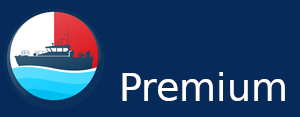Automated shipping is explored in terms of economics, technology, safety and the environment under the broad themes of ship design and engineering, command and control, navigation, communications, security, regulatory issues, and training. This includes initiatives for autonomous shipping as well as civilian implications of military ship automation programs. This book is primarily for maritime professionals, regulatory authorities, insurers, and environmental groups. It also suits undergraduate students involved in deck officer training, and graduate students and academics involved in research in ship design, operations and management.
Unmanned ships and autonomous ships are quickly becoming a reality, making shipping safer and more efficient. However, traditional tasks and functions are becoming blurred as new technology changes how the unique needs of different sectors are met. In addition to large vessels dedicated to the transport of goods and cargos across the oceans, major efforts are underway towards the automation of small coastal shipping that includes ferries, tugboats, supply and service vessels, and barges. Automated vehicles are also replacing conventional ships for inspecting and servicing pipelines, drilling platforms, wind farms and other offshore installations.
Automated shipping is explored in terms of economics, technology, safety and the environment under the broad themes of ship design and engineering, command and control, navigation, communications, security, regulatory issues, and training. This includes initiatives for autonomous shipping as well as civilian implications of military ship automation programs. This book is primarily for maritime professionals, regulatory authorities, insurers, and environmental groups. It also suits undergraduate students involved in deck officer training, and graduate students and academics involved in research in ship design, operations and management.
Automated shipping is explored in terms of economics, technology, safety and the environment under the broad themes of ship design and engineering, command and control, navigation, communications, security, regulatory issues, and training. This includes initiatives for autonomous shipping as well as civilian implications of military ship automation programs. This book is primarily for maritime professionals, regulatory authorities, insurers, and environmental groups. It also suits undergraduate students involved in deck officer training, and graduate students and academics involved in research in ship design, operations and management.
Read more...
Video Maritime Pilot - The grounding of Leda Maersk - Episode 5
by Captain Ahmed Sati - published on 12 August 2024
Article The pilot ladder shouldn’t be a killing ladder!
by SAFETY4SEA - published on 11 February 2022
he safety of pilot boarding and disembarkation is a major headache for the shipping industry. Every year, many pilots are injured or died due to old (worn-out) or improperly rigged pilot ladder facilities, and/or the process of placing the pilot ladder results in injuries to the crew, notes Capt.Zhao Qingwei, Marine Safety Manager at DASIN SHIPPING PTE LTD.


